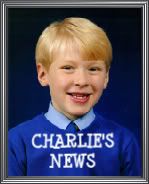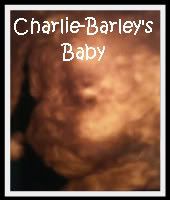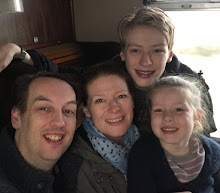 Hi everyone. Well, the days are ticking by rather too quickly for our liking as Charlie's cardiac catheter approaches. We're going to tell him tomorrow, or possibly Saturday, so he's got time to ask any questions, but hasn't got enough time to start worrying about anything. We've been playing with his doctor's set though, and reading some of his hospital stories.
Hi everyone. Well, the days are ticking by rather too quickly for our liking as Charlie's cardiac catheter approaches. We're going to tell him tomorrow, or possibly Saturday, so he's got time to ask any questions, but hasn't got enough time to start worrying about anything. We've been playing with his doctor's set though, and reading some of his hospital stories.I've spoken to the hospital this morning, and they are trying to sort out some accommodation for Pete while we're there (I'll be staying on the ward with Charlie). Obviously parents who are there for longer, and whose children are more poorly will take priority - and rightly so - but it'll be a bit of a pain if Pete has to find a hotel at the last minute. Parking is also a bit of a nightmare at the hospital, and it costs £10 (around $20) a day. Thank goodness we'll only be there for a couple of days, all being well!
I can't remember if I've actually told you what the catheter involves... we've learned so many medical terms since we had Charlie, we've forgotten that not everyone is as well up on the lingo as we are!
According to the dictionary, a catheter is just a 'tubular device for insertion into canals, vessels, passageways, or body cavities, usually to permit injection or withdrawal of fluids or to keep a passage open'.
A lot of people have only heard of catheters in terms of the ones you have when you can't get to the bathroom, but a cardiac catheter is something quite different. Basically, Charlie will have a general anaesthetic and his consultant will insert a catheter (a very fine tube) into one of Charlie's large veins or arteries - more than likely one in his groin. The doctor will then use X-rays to monitor the path of the catheter, as it is fed up through Charlie's body and into his heart. Once it is in place, some contrast, or dye, will be injected and more X-rays taken, enabling the medics to see exactly how well Charlie's heart is functioning. The catheter also lets the doctors get accurate measurements of the pressures and bloodflow inside the heart.
If the consultant discovers any problems, such as narrowings, blockages or extra veins, these can be treated during the catheter procedure as well.
While Charlie is asleep, he will also undergo a Trans-Oesophageal Echo, where an ultrasound probe (similar to the sort used for ultrasound scans of babies!) will be put down his throat, again allowing the doctors to obtain much more indepth information than usual about how his heart is functioning.
He should be in theatre for around an hour and a half.
His doctors will then assess the information they have found and will come to a decision about how soon he needs his third stage surgery - known as the Fontan. This will be his third bout of open heart surgery, and he will have to be put onto heart-lung bypass again. It is likely that this will also happen in 2008.
So there you have it, and apologies if you knew all that already!
In a way, it's strange to have to write all this medical stuff on Charlie's blog - but I guess we should be really grateful that in almost two years of blogging, there's been nothing medical to report, other than the odd cold and out-patient appointment.
What a wonder our little Charlie is.
Anyway, enough melancholy waffling for now - here's a pic of Charlie on his new stilts!









2 comments:
We will keep Charlie in our prayers this week. May you find peace during the time Charlie is in for his procedure.
God Bless,
The Tilson's
http://thetilsonfamily.spaces.live.com/
Hi Charlie, Mummy and Daddy.
Happy New Year to you all. We hope that the cath goes well (sure it will).
Love the photo of you on your stilts Charlie, we can't believe how you have grown.
Lucy sends you some kisses and tells you to be a brave boy. She says there is nothing to it (but I can understand how your mummy and daddy feel, because I know how I felt).
Lots of love to you all
Bev and Lucy
xx xx
xxxxx
xxx
x
Post a Comment